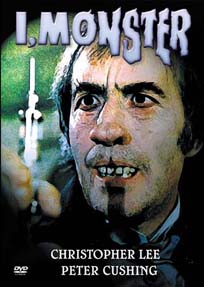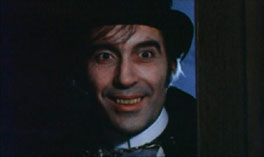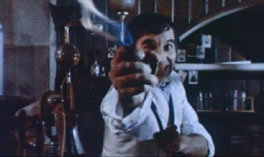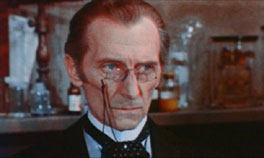 I,
MONSTER (1971)
I,
MONSTER (1971)Director: Stephen Weeks
Retromedia Entertainment
 I,
MONSTER (1971)
I,
MONSTER (1971)Psychologist Charles Marlowe believes he has developed a special serum which causes his patients to reveal their hidden alter egos: a troubled wallflower becomes an insatiable nymphomaniac and a meek giant is transformed into a blustery brute. Impressed with the results, Marlowe injects himself with the serum and emerges as Edward Blake, a maniacally smiling madman who steals, fights and kills with no remorse. Marlowe finds himself addicted to the serum, and only his close friend Frederick Utterson can save him.

Before this Retromedia disc was released, Amicus' production of I, MONSTER has remained a long-desired title for collectors of Christopher Lee, Peter Cushing, Amicus and British horror in general. But I, MONSTER has remained obscure for a very good reason: it's simply not very good. Essentially a remake of Robert Louis Stevenson's "The Strange Case of Dr. Jekyll and Mr. Hyde," writer Milton Subotsky (who also produced this sleeping pill) changed the names of the leads to avoid legal hassles and was able to write a vehicle for Christopher Lee, recovering from Hammer's DRACULA series. Lee is introduced as a quiet and curious physician with a sensitive side (his best scene is when he is forced to bludgeon his cat to death after injecting it with the serum); it is these opening scenes which are the best, with a different kind of Christopher Lee not usually caught on film. But to play the nasty Edward Blake, Lee plasters a silly grin on his face and goes to town chewing scenery and fellow actors left and right. This isn't to say the performance is successful, however; Lee comes across as being desperate to show his acting range, which apparently isn't as wide as fans believe. And when Blake really begins turning ugly, the ham only gets thicker. In addition to Lee's uneven performance, poor Peter Cushing is given very little to do here except add marquee value for co-starring with his most famous partner. Of the Lee/Cushing filmography, this is their least effective outing. Even NOTHING BUT THE NIGHT had an intriguing premise and Cushing was quite good in it. This is the bottom-of-the-barrel for Lee, Cushing and Amicus alike. Amicus was attempting to be a rival to the successful Hammer studios, yet they only obtained box-office with their series of horror anthology films.
 Students
of Stevenson's novel have said that I, MONSTER remains the most faithful adaptation
of the work to date, where other film adaptations feature liberal additions
and deletions from the source material. If this is the case, perhaps the viewing
audience is better suited to a bastardized version of "Jekyll and Hyde"
than a literate book-to-film version. At least then they wouldn't fall asleep.
Screen versions of the novel aren't very scary to begin with, but at least most
offered captivating performances and suspenseful atmosphere. There is none of
that to be found here. If audiences don't nod off, they should enjoy a knifefight
in the street (featuring rock singer/actor Michael Des Barres) and a few other
horrific sequences with Edward Blake, but for the most part, this is a Grade-A
snoozer which even completists will leave collecting dust on their shelf. The
most interesting aspect of I, MONSTER is its origins as a 3-D horror film. In
1971, this probably wouldn't attract many moviegoers, as the fad had died out
several years prior, so 30 minutes of footage were scrapped and re-shot, putting
the film behind schedule and over-budget. Traces of the 3-D footage remain,
as numerous objects are still thrust towards the camera. The film also stars
frequent British horror film faces Mike Raven, Kenneth J. Warren and Chloe Franks.
Ian McCulloch (of ZOMBIE and other Italian gore fests) also makes a cameo.
Students
of Stevenson's novel have said that I, MONSTER remains the most faithful adaptation
of the work to date, where other film adaptations feature liberal additions
and deletions from the source material. If this is the case, perhaps the viewing
audience is better suited to a bastardized version of "Jekyll and Hyde"
than a literate book-to-film version. At least then they wouldn't fall asleep.
Screen versions of the novel aren't very scary to begin with, but at least most
offered captivating performances and suspenseful atmosphere. There is none of
that to be found here. If audiences don't nod off, they should enjoy a knifefight
in the street (featuring rock singer/actor Michael Des Barres) and a few other
horrific sequences with Edward Blake, but for the most part, this is a Grade-A
snoozer which even completists will leave collecting dust on their shelf. The
most interesting aspect of I, MONSTER is its origins as a 3-D horror film. In
1971, this probably wouldn't attract many moviegoers, as the fad had died out
several years prior, so 30 minutes of footage were scrapped and re-shot, putting
the film behind schedule and over-budget. Traces of the 3-D footage remain,
as numerous objects are still thrust towards the camera. The film also stars
frequent British horror film faces Mike Raven, Kenneth J. Warren and Chloe Franks.
Ian McCulloch (of ZOMBIE and other Italian gore fests) also makes a cameo.

Retromedia's disc of I, MONSTER kicks off with a disclaimer stating that the transfer was taken from a number of different elements of varying quality. But the non-anamorphic, letterboxed feature (at 1.85:1) seems to be from one print, and an ugly one at that. Fleshtones are way off, grain is non-stop and everything is much too dark to enjoy. The dupey look of the print may look slightly better than previous bootleg video versions (this is the first time it’s received a legitimate home video release in the U.S.), but it doesn't do the disappointing feature any favors. Mono audio is at times too muffled, so crank the volume.
Extras are limited to a stills gallery and the theatrical trailer, which is in much darker and ragged shape than the feature. But the best supplement can be found in the keepcase: a booklet reproduction of the British pressbook is an awesome bonus and even if viewers don't like the film, glancing inside the booklet to peek at advertising gimmicks and posters and lobby cards is a great piece of history. (Casey Scott)